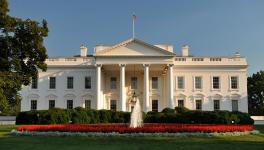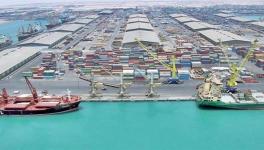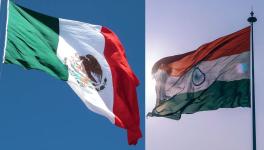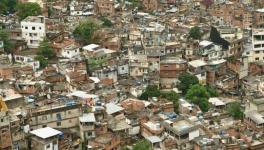BRICS Bank: A Challenge to the West?
In the 6th BRICS summit, two weeks back, the BRICS countries announced the formation of the New Development Bank or the BRICS Bank. Though the economic significance of this development is a matter of debate, many people are of the view that it will considerably change the political power paradigm of the world. In the following interview, Rajat M. Nag, Former Managing Director General of the Asian Development Bank (ADB), talks to Newsclick about this latest development and explains why he thinks it will tilt the balance of power in favour of the East.
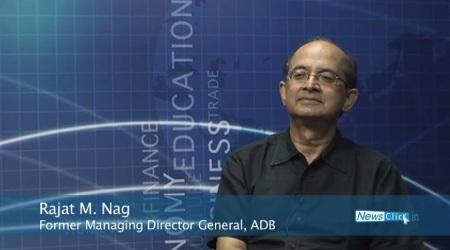
Prabir Purkayastha (PP): Hello and welcome to Newsclick. Today we have with us Former Director General of ADB (Asian Development Bank), Rajat Nag, to discuss the newly created, at least announcement of the BRICS Bank. What does it mean? What implications are for not only for the economy of the world but also the political economy of the world? These are the issues that we will be taking up. Rajat, this announcement has been sometime in the coming. There have been preparations for it. There is the BRICS bank and also there is supposed to be a reserve fund. What do these two things really signify?
Rajat Nag (RN): I think at a fundamental level it signifies the shift of the soft power from the West to the East. The centre of gravity of the economy, financial and economic strength is definitely moving inexorably eastwards. Asia now accounts for about twenty seven percent of the global GDP. In another about thirty years, it will be over fifty percent. The BRICS bank that you mention comprises of BRICS- Brazil, Russia, India, China and South Africa. These five countries account for roughly about twenty five percent now of the global GDP. But just about ten years back, it was only about nine percent. So there is huge growth. So what BRICS Bank I think reflects is the reality of the growth of the economic power of these countries but them not getting commensurate importance or place at the global table. Creation of the BRICS Bank I think is basically the world changing; the emerging economies becoming much more important. The BRICS for example account for forty two percent of the world's population. So it reflects the failure in one sense of the existing institutions not being able to accommodate the aspirations of these countries and therefore them saying well look then we’ll have to create our own space.
PP: There are two things over here. One is the reserve fund that is being created. Shall we consider it equivalent to the IMF? Is it for specifically bailing out economy?
RN: That's the idea. Look, if any of the countries get into the trouble, then there is this pool of currency which will be drawn upon. Yes, the idea is that if any particular country gets into trouble, in a short term balance of payment crisis… But I have to say- and this is where the devil is in the details- 100 billion dollars for a group of countries which includes China, India, Russia, Brazil and South Africa is going to be awfully inadequate. But I don't think it is the money which is the point. The signal has been given that the BRICS countries are saying look we will start having an arrangement in which we will control our destiny in that sense.
PP: But it is more for helping others than rather than themselves because you said, 100 billion is peanuts for China for instance or even for India today.
RN: You know, this is one thing which is not clear enough. That is part of the process that the BRICS countries will go through over the next couple of years in details. Is the BRICS Bank only for the BRICS countries or for other emerging economies, and therefore global? In the sense of what Asian Development Bank is for Asia, the African Development Bank is for Africa. Latin America is covered by Inter American Development Bank. But the important thing as far as I am concerned about the BRICS Bank and the CRA is a statement of intentions and aspirations, and a reflection I would say of the frustrations these countries have felt- and very justifiably- of the governance structure of the present arrangements. So therefore, now they’re saying that we’ll have to create something where we can decide what will happen.
PP: The issue still remains whether it is for the BRICS or for other countries as well. That's not clear.
RN: That's not clear. Though, I understand that the proposal is to open it up to other countries. Other countries can join and that the lending of the BRICS bank will not be only for the BRICS countries but others as well. Particularly the infrastructure space. But those are the details which I think have to be worked out.
PP: So you were also talking about the unequal nature of the governance of the financial institutions of the world. Basically, in this case the IMF and the World Bank being the two key ones apart from the regional banks as well. Now, in this what were the key problems that you think happened and which drove these countries in this direction?
RN: You know, I think the political institutions always have difficulty in keeping pace with the economic changes and the economic changes have been phenomenal as I have been mentioning. The BRICS countries have been gone from being under ten percent- nine percent of the global GDP in 2003 to roughly over twenty five percent now. The political arrangements in the Bretton Wood institutions also the regional banks reflected a share holding which is forty, fifty, sixty years old. It has changed, no question about it, but hanged marginally. For example, in the IMF, Belgium has a larger share holding than Brazil and Brazil's economy is several times that of Belgium. Now, the political institutions have difficulty adjusting to that. So countries like Brazil, certainly countries like China and India are saying- Hey look, this was okay maybe forty years back or even thirty years back. But it is not OK now. So can we have some more say in the governance? Can we have a larger place at the table? And I think the share holdings did not respond as rapidly as obviously as these countries wanted. And therefore, they said look if we can't make the changes we want to see, then we’ll have to go and set up our own institution. I personally think it’s unfortunate because there are limited resources, both financial and human. So creating another institution obviously will not be easy. But I can see why the BRICS countries felt that was the only way to go to give shape to their aspirations.
PP: There is also other part of it- the politics of the world and there is no question that the IMF and World Bank have really, in some sense, tailored their lending according to the interest of the political players and key among them being the United States. So the fact that the IMF is bailing out Ukraine right now when there is a civil war and the fact that IMF bailed out itself is a part of the issue which led to the East and other parts of the Ukraine coming at loggerheads, all this shows that the IMF, World Bank do play a political role. It’s just not an economic role.
RN: You know, our charter- since I was with ADB till recently- is apolitical. But I always said and I said it very publicly we are apolitical but our owners are very political. Our owners are countries and therefore, you are right countries such as the US and Japan in ADB’s case, the US and Europe in case of the World Bank and IMF, they obviously- because of the shareholdings- exert influence on the institution’s policy and the direction of the institution. And this is exactly what countries on the receiving end, the emerging economies, basically were resisting. They were saying we don't have a problem of these institutions demanding things of us in terms of project implementation or good governance or environmental standards so long as they are our views as well. We the emerging economies feel we don't have enough seat at the table to influence that. They tried and they are still trying. But I have to be fair that I think the governance changes have happened in the World Bank in the IMF, but for the purposes of the emerging economies, too slowly.
PP: At a glacial pace. Whatever you call it, really very slowly.
RN: I think countries like India and China started to feel that this pace is too slow for us.
PP: One part of it is what the emerging economies feel. The other part of it is what ones who are not emerging economies feel and what they have felt is that the IMF structural adjustment programmes have been devastating for them. The fact that they are agriculture oriented towards export, the food security is threatened, you import food and export something else. All this has been extremely damaging for instance the African countries. Of course, the fact that they are dependent on the trade terms which have gone adversely against some of the countries. So all these put together has meant that the IMF has acted almost as an instrument of politics of America and the European Union.
RN: I would have to respectfully disagree with you. The views expounded are not sort of you know black and white. There are problems. But there are also problems with protectionism. There are also problems with food security if it is taken to an illogical extreme where everybody thinks they must produce all the food they need. There is something called trade, something called terms of trade. So I am not getting into the merits of those as such but your general point is valid that the structural adjustment loans were seen to be imposed on them and my point is without going into the merits of a particular structural adjustment programme, the only way they would succeed I feel, and the only places where they have succeeded is when it is not seen as a programme imposed from the outside, whether it is IMF, World Bank or anybody. But it is something that the countries themselves have made. There have been some very important structural adjustments made necessary in many of these countries. But the only places where they have really succeeded in, is when it has been organic, when they have made those changes. Sometimes, the perception that it has been thrust on them has made it politically very difficult for these countries to do it.
PP: Rajat I have this entire problem. I’ll come to the BRICS as well. The entire problem is that here you have people sitting in the IMF who generally have not been very successful in the countries in which they have practiced their economics, and have been exported to the IMF; coming out with a blue print which does not change an iota whichever country they go to. So essentially, it is identical. You just to change the name of the countries and you put a few other things and that becomes the IMF structural adjustment programme. This has been the blue print which has been followed by the IMF which even people like Stiglitz have been very critical of.
RN: I think if you look at IMF's own evaluation, they would agree that their prescriptions have sometimes been one size fits all. That is not the case certainly in the Asian financial crisis. The prescription needed for handling that crisis- I am talking about 1997-8- was certainly not appropriate if we brought in what was happening in Latin America. Asia for example we did not have fiscal deficit we had fiscal surpluses, therefore, to come in and say that we need to tighten the expenditure was the wrong prescription. IMF I think would be the first to admit and they have admitted that.
PP: After the event, a long time later.
RN: And I think to be fair to them, they have recognized that that was the wrong prescription. But my point is that the global governance structure of these institutions has not kept pace with the growing economic and- therefore I would hope- political importance of the emerging economies and the BRICS bank is a reflection of that. Now there are going to be challenges in the implementation of the BRICS bank and we can talk about that if you wish. The devil is in the details. But I am fully supportive of this political aspiration that this is the only way that these countries could in fact assert their growing economic influence which they felt was not being reflected in the institutions.
PP: Agreed. That’s the reason that the BRICS countries felt that they are not getting their due. Also the fact that the dollar being the world's reserve currency gives a certain weight to US which would be out of proportion to what they should enjoy today and the fact that they are also imposing financial sanctions on countries which did not bow to the US sanctions for instance on Iran and now Russia itself is being sanctioned. There’s a whole set of things which are happening which are outside the financial institution sphere but which have an impact on the financial system as such. But the key issue for me is in fact two sets of issues. One is what will be the currency for the BRICS Banks? But if it is exactly the same, the dollar denominated, and the de facto political power of the US dollar continues in the financial system. Do you think there is also therefore a move towards moving away from the dollar in some sense?
RN: Again, I don't know how it will emerge. But my feeling is that the BRICS bank's currency, principal currency will be dollar partly because the borrowings in the international capital market are also in, not exclusively but principally in, dollar. I am sure they will raise funds in Euros, Renminbi or Yen. So dollar will remain a currency of great importance as a reserve currency for the foreseeable future. We had in the ADB some years back talked about the possibility of Asian Currency Unit. I think, that is the way the world will move. It will be a basket of currencies which was of course the origin of SDR. But, leaving that aside, the idea would be that you would have the Chinese Renminbi, the Japanese Yen, the Indian Rupee, you will have the Euro, and the Dollar because I think it will be inconceivable to think of a world financial arrangement without the dollar. But I think you will probably see the growing importance of the others being reflected in a basket of currencies. Now, there is going to be a huge process of this adjustment and how do you settle trade. You have to settle trade in a currency or a basket of currencies. But I think the world will have to move towards that basket of currencies reflecting again the basket of economies which are growing in importance. I mean, it is not going to be a dollar centric world and therefore, in due course it cannot be a dollar centric reserve. But when will be this multi currency, multi basket happen, time will tell. But I had gone public saying that we will not see the ACU, Asian Currency Unit till about 2050 and I still hold that view.
PP: We will not see it before 2050 or we’ll see it be a reality in 2050?
RN: I would think reality by 2050. I think you will see parts of it coming in, exactly the point you raised. About the BRICS Bank, the question you raised is a very perceptive one. You created the BRICS bank to be able to have an alternative arrangement and yet your currency of operation is the dollar. But I think there is no other alternative but they will talk I think in terms of a greater local currency for financing for example. If you get into a finance and infrastructure project in India, why not have a sort of arrangement that BRICS would raise rupee funds in India to lend? I think there will have to be some fairly innovative, forward thinking discussions on these.
PP: But this therefore is an indication that the existing financial institutions, really the Bretton Woods system and the reserve currency of the dollar, both these are in some sense under challenge by the BRICS and hopefully if they can get other countries by joining them as well. Would you see this as an indication of that?
RN: Yeah, I would say so. The dynamics of the global economy is changing and the very fact that… I have given you the figures about the absolute. During the period 2003 and 2009 if I remember correctly the BRICS countries accounted for 65% of the growth in the global economy. As you and I were talking earlier, during the financial crisis of 2007-2008 it was really China and to some extent India and other emerging economies which really bailed the world out. Had it not been for China having such a massive fiscal expansion programme, the world would have probably seen fairly dark days. So, I think you are going to see this dilemma playing out in all of these discussions including the role of the dollar as a reserve currency. But I think the dollar as a reserve currency for the foreseeable future is a given but I think these are issues which will have to be discussed.
PP: Interesting point you have made China bailing the world out because essentially everywhere else Europe and United States is fiscal conservatism, cut expenditure. While actually China would have followed the Keynesian prescription of expanding and the global economy really then responded to this Keynesian proposition of expanding what they did to build infrastructure and so on. The last question is really linked to my earlier one about perception of IMF structural adjustment programme and so on. Do you think the BRICS Bank, in that sense will have a philosophy and the economic philosophy will be different? Because we look at for instance what these countries are- Brazil, India, South Africa, all three are following neo-liberal prescriptions of some kind or the other which is really fiscal conservatism, not expanding the deficit and so on. This is one part of it. So if they follow what shall I say the fiscal book, the bible of the IMF and World Bank if you will, it will not make much of a difference to the really poorer countries who are at the receiving end today.
RN: You know, I have to recast that a bit. I think it is not a question of IMF philosophy or not. It is more a question of I would say almost economics 101. And economics 101 would basically say that look somewhere, not necessarily at every point in time, you will have to live within your meets and countries have to do the same just as you and I have to do. So the fiscal conservatism is not an IMF prescription. I think it is called fiscal prudence. But that does not mean that you cannot and must not have a role for a greater fiscal expenditure say on infrastructure which is what China did. The reason China is doing so well now that starting in the eighties they made massive investments in infrastructure which was fiscally very demanding and therefore, they had to run obviously, large fiscal deficits. So the BRICS bank, I don't know what they will do but my feeling is that they, will follow the principles of economics 101.
PP: Of course, economics 101 as talked in Chicago and other places and not identical.
RN: But the principles will not be that much different.
PP: Rajat I think the point that you are making is a very important one. Fiscal deficit provided you can finance it in the future. So your growth must be such out of the deficit you run today that the deficit could be met in future.
RN: By when is the question? Certainly, I mean you can have fiscal deficit for a certain period but it can't be forever and it can't also be totally unsustainable. But the greater point which you raised, and which again I don't know what the answer is, and this is where I keep saying that I am unequivocally a great supporter of the BRICS Bank concept. But the details will be very important. One will be exactly what you have said. Five countries equal share, so whose views will prevail? The idea is nobody's therefore a consensus. The second one Prabir which I think the institution, the BRICS Bank will have to deal with, is the business model. At the moment, the Asian Development Bank, the World Bank basically operates on a very simple business model. The credit rating of the institution is actually higher than its members because of the collective strength and so called callable capital. The bond holders know that if there is a problem for the institution to repay its loans, the share holders will cough up the money. That is because there are countries in ADB's case sixty seven member countries all Asia, Europe, all of North America. In the BRICS bank if it's these five countries what will be the credit rating of these institutions in the international market? Number one. Number two, if the credit rating is not high and if the institution can't borrow money cheaper than what its member countries do then what is the benefit? The ADB borrows money at a rate cheaper than any of our borrowing countries, we add a spread and then we can lend on. So these are the sort of details which BRICS bank will have to serve. First, as you said are the economic policies. Secondly, as you said which I think is equally important is the financial model. How do you generate the funds? You can't lend money out of equity. No matter how much equity you have it will run out. The third will be you don't want to be seen to be imposing strict conditionalities for obvious reasons. But on the other hand you want to impose discipline of fiscal management. You want to impose disciplines of the environmental standards. You don't want to get into situations that you’re building infrastructure without really knowing if it is sustainable therefore, the whole issue of implementation. So there are details which the BRICS bank will have to work out and those are still on the drawing board. But my feeling is that these countries will in the next couple of years have to come to grips with it and it's doable but just because the BRICS bank has been announced, does not mean that all of this will get solved automatically. So there are still some challenges but overall, the establishment of the BRICS bank, going back to the fundamental point you made, is I think a signal of the emerging economies that they are dissatisfied with the present arrangements of governance and want their own say.
PP: Interesting also because you started by saying that that kind of programme which is done with the consent of the state taking into account its own requirements is much more likely to be successful than the kind of external, imposed, one size fits all programmes which these institutions did and because they are relatively politically weaker than the United States, the IMF and the World Bank which grew out of the Bretton Woods, that they likely to be more sensitive to these issues hopefully.
RN: Hopefully, very much so. Certainly in the ADB my experience there was whenever it was a programme that we designed which reflected the reality on the ground and therefore, we treated each country differently and their capacities are different. I mean you might have a very good prescription, but if the institutional capacity in that country cannot bear it, then it will be counterproductive to ask for that and they have worked and I hope very much that the BRICS Bank even more so than the regional banks will be able to reflect these reality.
PP: Thank you very much Rajat. We will come again on these issues to see how the BRICS Bank develops. The devil as it comes out in the detail.
RN: Thank you very much.
Get the latest reports & analysis with people's perspective on Protests, movements & deep analytical videos, discussions of the current affairs in your Telegram app. Subscribe to NewsClick's Telegram channel & get Real-Time updates on stories, as they get published on our website.









